Magazine
One of the most important goals of CCCU institutions is to help students grow spiritually and develop their character. It is also one of our biggest challenges. In order to guide students in their spiritual growth, we need to know where they are. We have to assess how our students are doing spiritually and evaluate the effectiveness of our spiritual programs. In fact, secular accrediting agencies have begun asking for evidence that we are assessing and improving student spiritual development, since it is a core part of our mission. For more than a decade, the CCCU has assisted its member institutions in this endeavor by coordinating efforts to assess student spirituality.
The Spiritual Transformation Inventory (STI) was first offered as an optional part of the CCCU’s Comprehensive Assessment Project (CAP) in 2005, and it has since been regularly administered by many member institutions. A comprehensive assessment that evaluates both students’ spirituality and campus programs, the STI has demonstrated high reliability and validity and has been administered to more than 28,000 students at over 40 Christian colleges.
A Conceptual Model of Relational Spirituality
When campuses administer the STI, students report on their spiritual experiences in 33 different areas, which are grouped into five domains:
- Connecting to God
- Connecting to Self & Others
- Connecting to Spiritual Community
- Connecting to Spiritual Practices
- Connecting to God’s Kingdom
The STI also measures the importance and level of impact of 24 campus spiritual programs and 24 spiritual outcomes. Results are provided for the five domains and 33 areas, and for the 24 program items and 24 spiritual outcomes.
The theoretical approach to the STI centers on the importance of relationship with God and others and is appropriate for a wide variety of Protestant denominations. This conceptual model is referred to as “relational spirituality.”
In using the STI to validate a model of relational spirituality, my research lab found that: 1) more secure attachment predicts higher “realized Christian spirituality” (defined by students’ connection to God, themselves, others and their spiritual communities, as well as their perceived spiritual growth in the past year), and 2) the positive impact of secure attachment is generally strengthened by spiritual practices and involvement in the spiritual community.
The STI provides a tool and conceptual model to assess students’ attachment tendencies (what students rely on for spiritual inputs), their spiritual practices and spiritual community, and their realized spiritual outcomes.
Overall Spiritual Standing for Students
Using results collected over the last five years from 9,608 students at 22 different CCCU institutions, we can identify strengths and areas of growth in students’ spirituality and in our campus programs. The majority of CCCU students are experiencing a substantial amount of spiritual growth throughout their education:

Spiritual Strengths for Students
Of the 33 areas of spiritual development, four areas stand out as relative strengths:
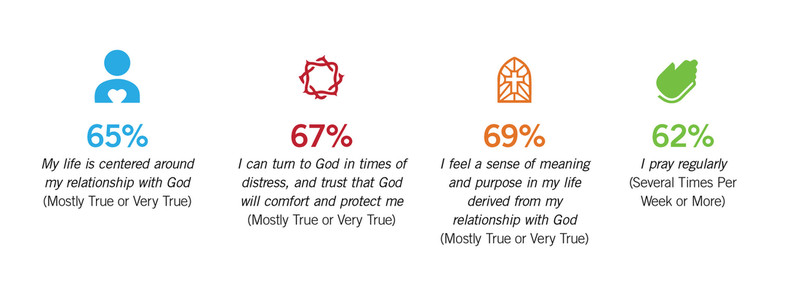
As one would expect, students doing well in one of these areas tend to be doing well in the others, likely because they all contribute to a unified spiritual vitality.
Growth Areas for Students
While it is evident that CCCU students are doing well in several foundational areas, the data also revealed five areas that show a need for growth among students as a whole:
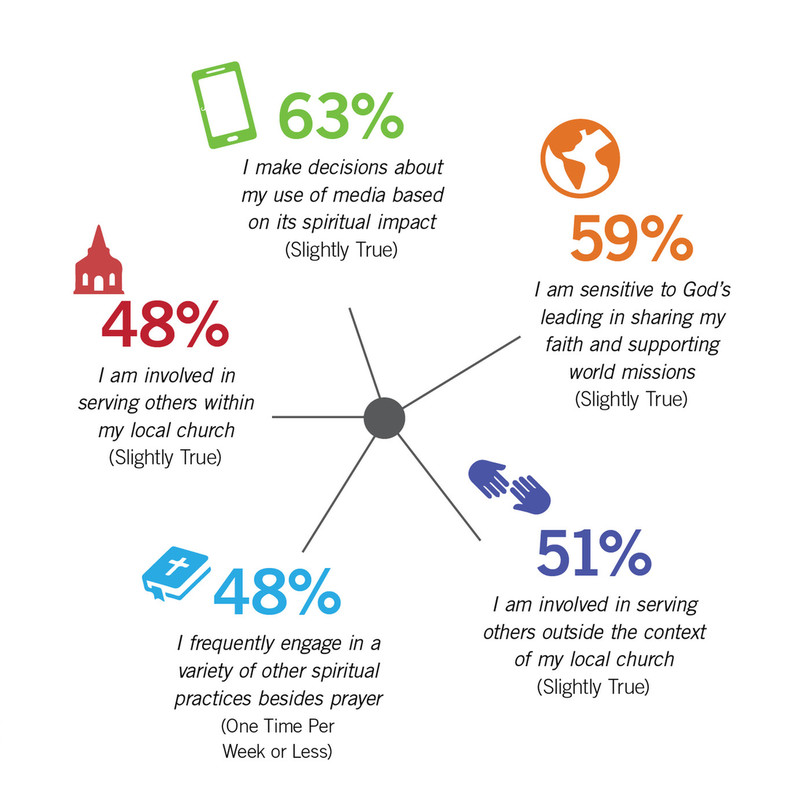
Social media has changed the way our students communicate and construct their identity. The STI results indicate that more work needs to be done to help students use social media wisely. Evangelism and service may be impacted by students’ busy schedules and immersion in their studies. While many schools emphasize these areas, the data suggest that evangelism and service represent growth areas for students.
Finally, it is interesting to note that students are reporting high levels of prayer, but lower levels of other spiritual practices. This suggests that it may be helpful for campuses to engage in discussions and structured experiences of other spiritual practices besides prayer.
Program Strengths
Of 24 program areas that are assessed, students reported that nine are both important and have a positive impact on their spiritual development:
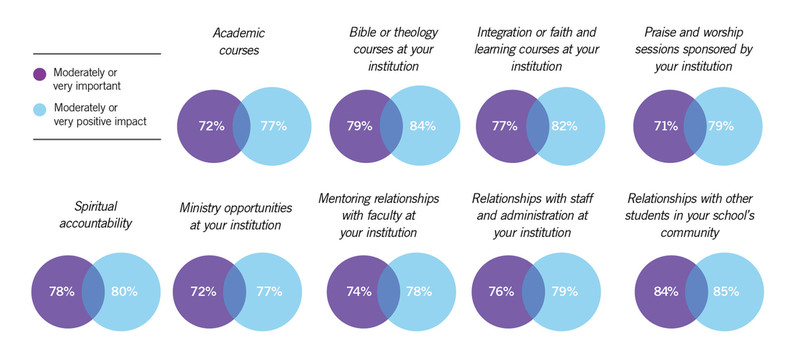
Top Spiritual Outcomes
The STI also asks students to rate 24 spiritual outcomes in terms of 1) how important it is for their school to help them with these outcomes, and 2) the impact the school as a whole has had on these outcomes. Though all outcome areas showed high importance and impact ratings among students, the top five are noteworthy:
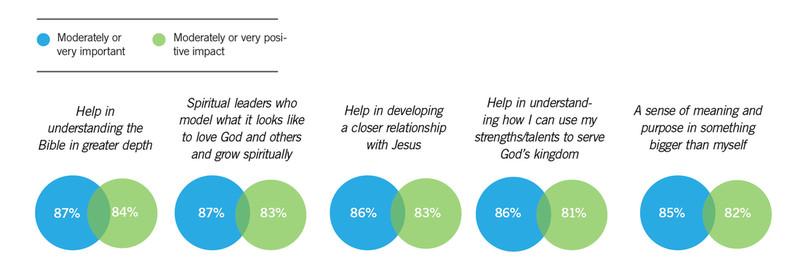
It is interesting to reflect on the relationship among these five outcomes. A sense of meaning and purpose is foundational for our well-being, and we know this comes from connecting to something larger than ourselves. Recent research by psychologist Roy Baumeister and his colleagues shows that people experience meaning as distinct from happiness or positive emotions. These five outcomes are interrelated and link directly with the five areas that Baumeister found to be associated with a sense of meaning in life. When we help students grow in these five spiritual outcomes, we help them embark on a life of meaning and purpose, ultimately found in relationship with God.
Qualitative Themes of Students’ Spirituality
In addition to using quantitative measures of spirituality like the STI, it is also helpful for campuses to gain a more in-depth view of their students’ spirituality through interviews, focus groups and qualitative analysis. In a recent series of qualitative studies with CCCU students, we sought to do this by investigating themes that differentiated students considered to be spiritual exemplars from those judged to be to non-exemplars. Our findings showed that students who are considered to be spiritual exemplars 1) take more ownership of their faith, 2) are more intentional about creating spiritual community, and 3) face and accept spiritual pain.
We also found six general themes that characterized all students’ spirituality – three positively oriented and three negatively oriented:
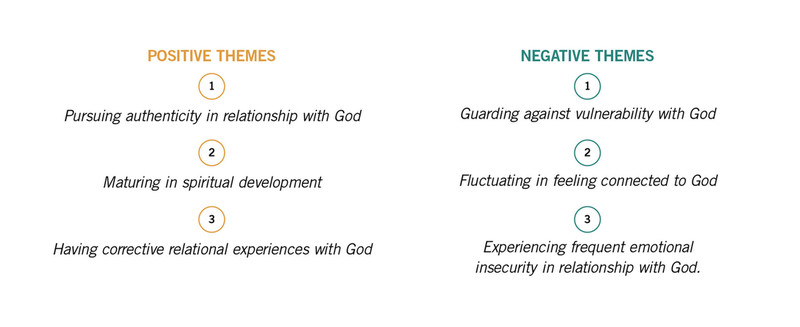
Using the STI on Your Campus
How, then, can STI results help your campus’s spiritual formation efforts?
Accurate Assessment of Campus Spiritual Development Programs
The STI can be administered to all class ranks. Many campuses administer it to each cohort when they are freshmen and seniors. The results allow campuses to identify relative strengths and growth areas in terms of students’ spiritual experiences. In addition, STI results enable campuses to identify program strengths (in which students report high importance and impact) and challenges (in which students indicate low levels of impact in areas of high importance). This information can be used to improve spiritual formation programs and outcomes. This allows schools to focus their efforts on areas of challenge and to track and document the impact of new programs. In addition to traditional programs, many institutions are integrating the STI into online programs to track spiritual outcomes for these cohorts. Identified spiritual strengths and challenges can also inform strategic planning processes.
Personalized Feedback for Each Student
In addition to group reports that provide aggregate results for campuses, individual reports provide students: 1) immediate results and feedback on all 33 scales; 2) a personalized 6-week growth plan; and 3) a curriculum of soul projects for all 33 areas. A growing number of schools utilize the individual report for students as part of a required class, internship experience or online/hybrid program.
Comparison to Other CCCU Schools
The STI provides national benchmarking based on data collected from other CCCU institutions. The CCCU database is updated daily and can be segmented by class rank. This allows campuses to evaluate their students’ overall spiritual development compared to other CCCU institutions, providing an important view of their students besides raw scores.
Accreditation Resource
STI results are also valuable for documenting spiritual outcomes for accreditation purposes. Schools can document improvement in spiritual outcomes as a result of spiritual programs. This allows campuses to show that they are using assessment results to improve programs and thereby closing the assessment loop. CCCU schools are generally reporting improved spiritual outcomes when they use STI results to inform decisions regarding their spiritual programs. The ultimate goal of the STI is to assist campuses in helping their students build a strong spiritual foundation for a life of love and service in God’s Kingdom.


